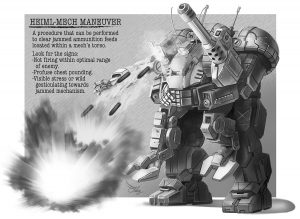Eridani Light Horse lawsuit
Sarna News

- Bad ‘Mechs - Sentinel
- HEXTECH Review - Wave 3 Brings More Urban Options To Your Battlefield
- Your BattleTech News Round-Up For March, 2024
- Crashing 'Mechs With Jennifer Brozek, Author Of The Rogue Academy Trilogy
- Getting The Word Out With Rem Alternis, Catalyst Community & Marketing Director
- Read more →
You must add a |reason= parameter to this Cleanup template – replace it with {{Cleanup|reason=<Fill reason here>}}, or remove the Cleanup template.
Cleanup tagged articles without a reason field
External Links
The following link was material written by Scott Malcomson and published by WizKids LLC to its official BattleTech website "ClassicBattleTech.com" in August of 2002.
* http://web.archive.org/web/20020804162508/www.classicbattletech.com/ELH.html
In October 2001, WizKids LLC (listed in the site's legal documentation of the time as its primary owner and operator, in partnership with unnamed "affiliates") published a version of this work which had originally been developed 'on spec' by Malcomson in 1996. According to later court testimony provided in writing by former website administrator Jason Knight, Malcomson's work had been "copypasta'd" from his personal website by someone working for ClassicBattleTech.com. Although a portion of the site had been set aside for fan-fiction and art, the material was incorporated into the site's official online database for articles pertinent to various in-game factions.[citation needed]
This version of the work did not include credit to Malcomson for his contributions, but it did include a claim of copyright for WizKids regarding the article.
On discovery of this, Malcomson lodged a complaint with the site's webmaster, allegedly receiving an apology in response followed by a request to continue using the work.[citation needed] As the 'on spec' material used had been a working draft, Malcomson provided an updated version which WizKids published in the same fashion as it had the first. This time, Malcomson was credited on the article's page and in the website's formal "Credits" section.
This material remained on the website until May 2005 when it was removed from the site.
Malcomson's inquiries on the site's forums were allegedly met with a denial from site admin Jason Knight that the article had ever been considered official. Malcomson then claims to have written and called WizKids, and then The Topps Company, but allegedlly no response was received.[citation needed]
When Topps declared in November 2008 its intent to sell WizKids, Malcomson filed suit against Topps to assert not only the validity of his contributions to the property, but his possession of copyright specific to his own original elements. Malcomson represented himself _pro se_. Topps allegedly communicated with Malcomson, and and stated that they would not discuss the matter with him except by litigation.[citation needed]
During the case's discovery process, Malcomson raised old records from his 'on spec' agreement with FASA, and used these records as the basis for three assertions:
- FASA had guaranteed that if they did not cut him a contract for use of his work, he was free to rework it for sale to other companies.
- He had been required to create the material with the intent that it "merge cleanly into the game universe", which established his own original intent to create a joint work.
- Randall N. Bills, BattleTech's Continuity Editor at the time WizKids published Malcomson's work, had also been one of the Line Developers FASA had assigned to work with Malcomson, and thus knew the original intent of the work when WizKids decided to publish it on their website.
Malcomson believed, on this basis, that he might have a claim as co-author in BattleTech, and amended his existing suit to reflect this. Topps moved to have the case dismissed as without merit, but the court declined.
"STATEMENT OF FACTS" DEBACLE
Topps claimed that Malcomson provided no "statement of material facts", and while a document appears in the body of his Motion for Summary Judgment, this did not meet an Arizona Revised Rule requiring that the statement of material facts be filed as its own separate document, and the court declared that Malcomson had not filed such a statement at all.[citation needed] Malcomson attempted to cite the Federal Rules of Civil Procedure to allow for the statement of material facts' acceptance, which failed.[citation needed]
THE JUDGEMENT
The Arizona District Court found for Topps, the core of its decision being that Malcomson had failed to show his work met the "three-factor test" for joint-work claims, established by the Ninth Circuit in Aalmuhammed v. Lee. The Ninth Circuit affirmed on the same basis of Malcomson not meeting the three-factor test, while affirming Malcomson had indeed made "periodic written contributions to a small portion of a popular science fiction gaming franchise", much in the same way that published fan letters contribute to comic issues. The District Court opinion asserted that Malcomson's works were a contribution, while denying that they sufficed to support a joint-work claim against the property as a whole. He did not succeed in his bid to establish co-authorship in the property.
Topps has since asserted that Malcomson has no claims of copyright in current and official BattleTech works, and that none of his works are canonical, while Malcomson currently holds that he is a contributor to "a small portion" of the property, and that since he was never signed to a work-made-for-hire agreement, these contributions made in collaboration with WizKids exist as jointly-created material.[citation needed]

